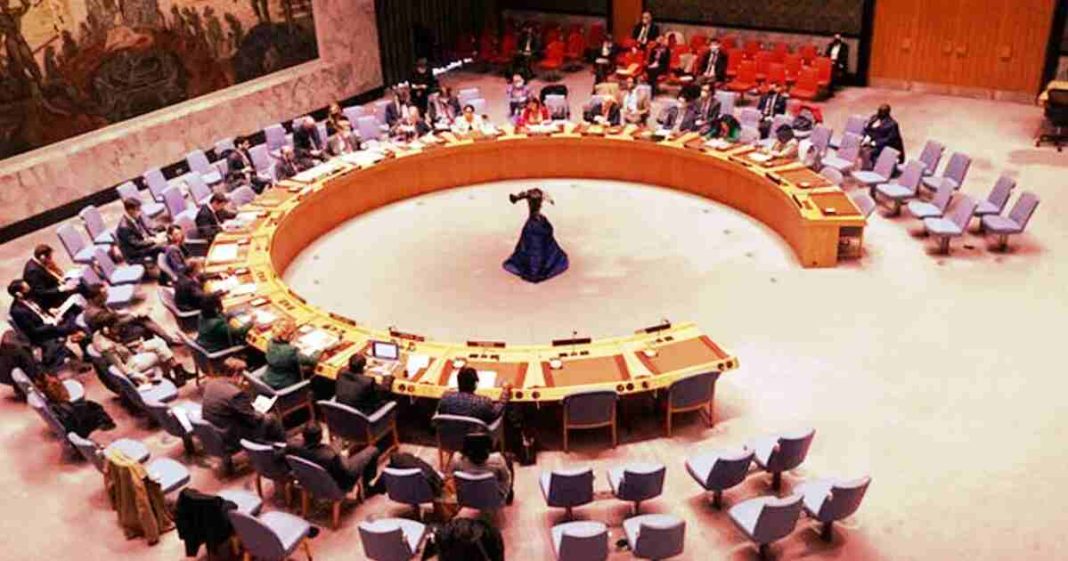Pakistan has officially commenced its eighth term as a non-permanent member of the United Nations Security Council (UNSC) for 2025–2026. This achievement reflects Pakistan’s commitment to global peace, multilateralism, and advocacy for issues like Kashmir, self-determination, and counter-terrorism. The historic milestone was marked by a ceremonial flag installation at the UN headquarters in New York, signifying Pakistan’s re-entry into the world’s most influential peacekeeping body.
Ceremonial Flag Raising
On January 1, 2025, Pakistan’s Alternate Permanent Representative to the UN, Ambassador Asim Iftikhar Ahmad, raised the national flag outside the UNSC chamber. Wearing a traditional sherwani, Iftikhar’s gesture of kissing and proudly unfurling the flag caught the attention of diplomats and journalists alike. The ceremony also welcomed Denmark, Greece, Panama, and Somalia, who joined Pakistan as newly elected non-permanent members, replacing outgoing nations such as Japan, Malta, and Switzerland.
Read More: UN official demands urgent action after horror of patients being …
The flag installation ceremony, introduced by Kazakhstan in 2018, has become a tradition to honor the new members of the UNSC. As Pakistan takes its seat, the nation looks forward to contributing meaningfully to international peace and security.
Pakistan’s Role and Commitments
In his first interview as Pakistan’s additional permanent representative to the UN, Asim Iftikhar emphasized the country’s dedication to the principles of the UN Charter, including international peace, equal rights, and the self-determination of peoples. Highlighting Pakistan’s long-standing position on Kashmir, Iftikhar reiterated that the issue remains a priority for Pakistan, aligning with the UN’s recognition of Kashmir as a disputed territory.
“Pakistan will always remain a strong voice for peoples under foreign occupation and oppression,” Iftikhar stated, underscoring the country’s focus on the right to self-determination for Kashmiris.
Additionally, Pakistan has been elected to the Islamic State (ISIS) and Al Qaeda Sanctions Committee, which plays a crucial role in counter-terrorism by designating groups and individuals as terrorists and enforcing sanctions. This appointment further solidifies Pakistan’s position in tackling global terrorism.
Key Challenges and Opportunities
Pakistan’s eighth term on the UNSC coincides with significant global challenges, including the ongoing Ukraine war, escalating tensions in the Middle East, and the resurgence of terrorism. Despite these challenges, Iftikhar expressed optimism, stressing that cooperative multilateralism is the best approach to addressing these crises.
During its two-year tenure, Pakistan will preside over the UNSC in July 2025, granting it the opportunity to set the agenda and foster dialogue on pressing international issues. This role is seen as a pivotal moment for Pakistan to shape discussions on global peace and stability.
Critique of the UNSC Structure
While reaffirming Pakistan’s commitment to the UNSC’s mission, Iftikhar voiced concerns over the influence of veto powers held by permanent members, which he described as a structural flaw undermining the council’s ability to address conflicts effectively. Pakistan also advocates for reforms within the UNSC to ensure equitable representation and improved functionality.
Focus on Regional Stability
Beyond its global commitments, Pakistan has reiterated its stance on fostering regional peace. Iftikhar highlighted Afghanistan’s stability as a key issue on the UNSC’s permanent agenda, emphasizing that a peaceful Afghanistan is crucial for the region’s security. Pakistan aims to work closely with member nations to facilitate dialogue and confidence-building measures to reduce tensions and promote sustainable development in the region.
Vision for Global Peace
Ambassador Iftikhar summed up Pakistan’s vision by stating, “Our success lies in upholding the UN Charter and international law under all circumstances.” He stressed the importance of addressing root causes of conflict, prioritizing diplomacy, and supporting peacebuilding efforts to achieve a secure and stable world.
Read More: US backs Israeli invasion of Syria
Pakistan’s tenure on the UNSC reflects its broader goal of advancing multilateralism and ensuring that the Security Council’s decisions align with the principles of justice, equity, and the collective welfare of humanity.














